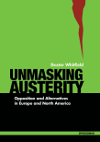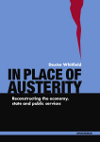No to Privatisation of Newcastle Schools
Newcastle City Council is seeking to address major problems in the condition of school buildings with a Government backed Private Finance Initiative (PFI) The PFI is presented as a means of generating additional monies for public sector capital projects.
No to the Private Fianance Initiative
Newcastle City Council is seeking to address major problems in the condition of school buildings with a Government backed Private Finance Initiative (PFI) The PFI is presented as a means of generating additional monies for public sector capital projects.
Newcastle is proposing a PFI scheme with a capital value of £33m covering six schools, Heaton Manor, Gosforth Central Middle, Gosforth East Middle, Throckly Middle, Westerhope First and Wingrove Primary.
PFI's were introduced by the Conservative Government as a further means of privatising the public sector and dismantling the welfare state. The Labour Government has continued to promote PFI's.
PFI's are about the ownership and control of our schools.
UNISON believes it is essential that a public debate takes place about the impact of PFI's before any deal is signed.
We urge you to:
- Raise the issue amongst parents and Local Governing Bodies
- Discuss the implications of PFI in local community organisations
- Make representations to your local councillor and MP
- Get more detailed information on the PFI from UNISON Newcastle City branch
What is the PFI?
Under the Private Finance Initiative, investment in new schools is financed by the private sector rather than using public money. This means that new schools and renovation work will be designed, built, financed, owned and run by a group of private companies.
A PFI consortium pays for the new school and in return the Local Education Authority (LEA) pays the consortium a regular fee, usually for between 25-35 years, for the use of the school which covers the construction costs, the rent of the building, the cost of support services and the risks transferred to the private sector.
A PFI consortia usually consists of a major construction company such as Tarmac, Wimpey or Mowlem; a bank or financier such as Barclays or the Royal Bank of Scotland; a facilities management contractor such as Initial or ISS, and consultants.
The cost of PFI - who will pay?
It is widely accepted that PFI projects cost more than publicly funded schools because of the higher cost of borrowing as Councils can borrow money cheaper than most private companies, high PFI project fees for lawyers, financial advisers and consultants, and the PFI consortia's profits. These additional costs mean that PFI schools will be at least 15% more expensive than publicly funded schools.
But PFI schools will only get approval if they provide value for money; in other words, the final cost must be lower than for conventional built schools. How can PFI schools start out being 15% more expensive yet provide savings for the local authority? How can PFI contractors recoup these higher costs and promise better value for money? The answer lies in the facilities management contracts - employing fewer staff, imposing flexible working patterns, job cuts and increased income generation from private use of the school and increased user charges.
What's wrong with it
Separating teaching from support services: Teaching staff will remain employed by the LEA but most support staff providing cleaning, caretaking, repair and maintenance, school meals, grounds maintenance, equipment and computer maintenance, will be employed by a private contractor. PFI creates two sets of interests and two employers in a school which could jeopardise an integrated educational team approach.
Community use of schools: Community use will have to 'compete' with private users and the PFI consortia's plans for income generation. Higher user charges are inevitable. The permanent split in responsibility for service delivery is likely to result in conflict over the use of school premises.
Governing bodies marginalised: Governing bodies have the power to decide whether to be a part of a PFI project or not, but PFI schools have a substantial part of their budget ringfenced. Payments to the PFI consortia will be made by the local authority, not individual schools.
Staff transfer to private contractor: Cleaners, caretakers, schools meals, repair, maintenance and other staff included within the scope of the contract, will transfer to the PFI consortia.
Equalities: PFI is a gender issue: At least seventy percent of the workforce affected by PFI schools projects will be women yet there is no reference to gender or race equalities in any PFI guidance.
Land deals: It is common practice that surplus land and property is included in PFI projects and transferred for private sector development.
More and bigger packages: PFI may start with a relatively small group of schools but it is likely to escalate into more and larger projects.
Teachers will be next: Whilst the operational element of PFI projects are currently confined to support services, it is unlikely to remain like this. Private management of public schools is growing in the USA and some firms have been trying to gain entry in Education Action Zones in Britain. It is only a matter of time before PFI projects start to include teaching duties and supply educational services.
Buying and selling schools: PFI projects will be subject to takeovers and mergers in the same way as companies are. Economic forces are likely to lead to the merger of projects to achieve further economies of scale. This will lead to more job losses and a requirement for 'flexibility' in the location of staff and working practices.
PFI impacts on all schools
Education planning distorted: PFI companies will have an economic interest in a school's educational performance, maintaining pupil numbers and ensuring its popularity is used to maximise income generation from community and business use of the school. PFI consortia will, therefore, want to ensure that they have the best teachers and there is minimum disruption to the running of 'the business'.
Educational planning is likely to be distorted by PFI projects. Conflicts and tension will exist between PFI and non-PFI schools over the quality of teachers, which schools are allocated resources for new or special projects and how any future budget cuts are distributed between schools and services.
Financial commitments: An increasing proportion of revenue budgets will be committed to PFI projects leaving a smaller proportion of the budget to deal with changing social needs and urgent priorities in non PFI schools.
PFI and Best Value
All PFI projects should be subject to a rigorous Best Value appraisal to ensure projects maximise the education, social and employment benefits for the local community and the authority and that continuous improvement is built into the contract.
What are the alternatives?
The basic issue is about ownership and control and there are no easy or quick fixes. Retention of a public education service will mean increasing capital programmes and either changing public spending priorities, using capital receipts, abolishing tax reliefs and/or increasing taxation. There are no short cuts. The basic principle and method of funding schools, hospitals and council housing is sound and should be retained.
The 1998 Trade Union Congress voted 55.4% to 44.6% in support of a motion against the Private Finance Initiative, demanding the government reinstate "proper capital funding to ensure the future infrastructure of the public services in a way which does not damage jobs and services."
Published by UNISON Newcastle City Branch,The House of Commons Select Committee on Health recently concluded that the "often spurious division of staff into clinical or non-clinical groups can create an institutional apartheid which might be detrimental to staff morale and to patients. We believe the Government should limit PFI to a number of pilot schemes until a proper evaluation of the impact on staff and patient care is produced." (Third Report, 1998/99 Session)
Room 145,
Civic Centre,
Newcastle upon Tyne
NE1 8QH
Tel: 0191-211 6890. Centre for Public Services
1, Sidney Street, Sheffield S1 4RG.
Tel: +44 (0) 114 272 6683
Fax: +44 (0)114 272 7066
Email: <mail@centre-public.org.uk>
Copyright © 1998-2017 European Services Strategy Unit
This document was created by
Chris Croome
on
2003-11-03 16:57:38.
This document was last modified by
Chris Croome
on
2006-11-27 12:17:27.
This website has been developed, maintained and hosted by Webarchitects since 1998.




